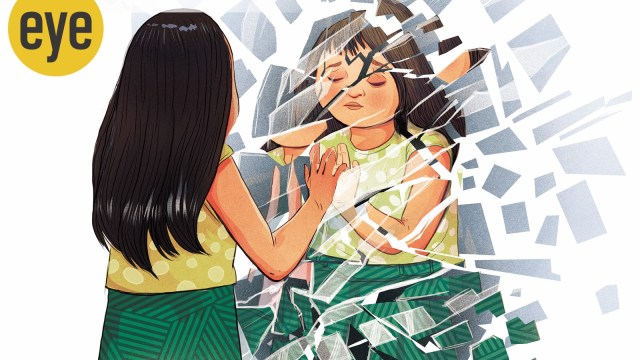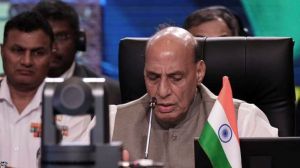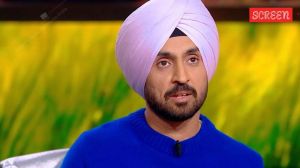Childhood is political not innocent
We are all indoctrinated into this dominant idea of a 'normal child' and pushed to promote it
 Depression, anxiety, addictions are ways that children respond to the world that does not find them palatable. (Credit: Suvajit Dey)
Depression, anxiety, addictions are ways that children respond to the world that does not find them palatable. (Credit: Suvajit Dey) “I am weird and socially inept.” “I do not fit in no matter how hard I try.” “People think I am a freak.” Behind these poignant words from children and young people, I have sensed a pain, a longing, a resignation. These are gentle, creative, loving human beings and yet grappling with a sense of living at the periphery and not really participating in the game of life.
Our society has fixed ideas on who belongs – grooves are prepared, and some children fit in marvellously, some have to be pushed and poked and there are some who just do not as they do not act like others, talk like others, perform like others – series of nots keep multiplying as they try to navigate the rigid normative pathways set out for them. These are children who are neurodivergent (Autism, ADHD, learning disabilities, etc.), diverse in terms of their gender, sexuality, body shape or living with a disability. The marginalisation magnifies further when they stand at the intersection of discrimination in terms of caste, religion and class. Childhood is not innocent, it is political.
The tragedy is that children are recruited into using society’s faulty lens for self- surveillance which might go something like this:
Internalising the problem – “I am the problem”
Invisibilising the issues of social injustice – “I am to blame”
Isolating themselves – “I am unworthy, unlikeable, and I do not belong.”
Children are not passive recipients of these injustices – they are constantly responding, trying to protect themselves. But sometimes these responses can come at a huge cost for them as they direct all their energies to survive in an unsafe world.
Masking This is a term from the neurodivergence lexicon which can be best explained as efforts or attempts to camouflage or hide struggles. Soha described to me how she had learned to mask her autism in school by closely watching her peers, “I closely observe how they dress, laugh, walk, talk just like David Attenborough would do in the wild. And then I copy them so that I do not look different.” It might seem like a very helpful adaptive strategy, but it comes at a cost for the person, “exhaustion, people pleasing and pressure to be and act like someone I am not so I can fit in.” Imagine living in a different culture where we do not understand the customs or language, but we pretend to do so just to get a sense of belonging. How depleted and confused would we be at the end of each day? What would it do to our sense of worth and agency?
Safeguarding Children’s behaviour always makes sense. Sajid had found anger and hitting out as a way to protect himself against ridicule and abuse directed at him for being gay. It has earned him the label of “bad behaviour” in school and constant reprimands that had fuelled the anger further. “Bad behaviour” is not a call for judgment but an opportunity for us to see what is implicit in the pain. Anger might hide the pain of not being seen, frustration as a testimony to seeking meaningful friendships, and hitting out as a way to safeguard themselves.
Hiding Rahil explained, “Being autistic is like being in a play and everyone knows their lines, but I am walking around with no script. So, I do whatever I can to hide.” And how did Rahil do that? By not speaking in class, not maintaining eye contact, and finding quiet corners in school to stay away from others until people started looking through him and barely remembering that he existed. And let’s not blame the autism for his struggles because it is not the autism that is causing him to invisiblise, but our rejection of people who do not fit our idea of “normal.”
We have to stand up to the dominant narratives around children which can cause so much pressure for them to conform as they are extremely dangerous. So rather than jumping to conclusions let’s stay curious. When we meet a child who is struggling let’s stay curious and ask, “What might he be masking?” “What might she be safeguarding?” “What might they be hiding from?”
I would like to clarify that this political drama has no villains so that we do not end up blaming parents or schools for this burden children have to carry. We are all indoctrinated into this dominant idea of a “normal child” and pushed to promote it. Even psychologists, psychiatrists and therapists can be recruited into this dangerous manufacturing of “good behaviour” and fixing children. Requests and referrals for “needs to act normal,” “get better grades,” flood our systems and unwittingly, we can become the teeth and claws of this dangerous beast.
Every October 10, owing to World Mental Health Day, there is a lot of hoo-ha about building awareness, training more psychiatrists and psychologists to bridge the “treatment gap” and I always wonder how we are missing forests for the trees. Depression, anxiety, addiction etc. are just a way for children to respond to the world that does not find them palatable.
Step out to step in A young man I met recently shared with me, “I have abandoned the idea of being like everyone else. I am Shiv and I am neurodivergent. I am learning how to play the game – when to mask and when not to mask. Masking robs me of my conviction in myself and makes me think I am a fraud. I am learning to let it go. I choose to be happy, less ashamed of being a weirdo,
I accept it and I own it. I choose to be more active and surround myself with people who love me the way I am.” I could not think of a more powerful manifesto for self-advocacy than this. But it would be deeply unfair if we let advocacy be an individual responsibility. It is our collective obligation to build a world that respects diversity rather than reject or pathologises it. We need to ask ourselves how can we step out of practices that promote society’s normative judgements and instead acknowledge and support acts of resistance? How can we receive young people’s stories of suffering and yet engage them in ways that not only address their individual struggles but also invite their agency to stand up for social justice and take social action?
And most of all, how can we step in to be allies in the young people’s journey so that through this solidarity we can create a more just world?
(Shelja Sen is a narrative family therapist, writer, co-founder Children First. She is a TED speaker, an international faculty at Dulwich Centre, Adelaide, Tutor at University of Melbourne and Editor-in-Chief of International Journal of Narrative Therapy & Community Work. Her latest book is Reclaim Your Life (Westland, 2018). Email her at shelja.sen@childrenfirstindia.com)






- 01
- 02
- 03
- 04
- 05

























